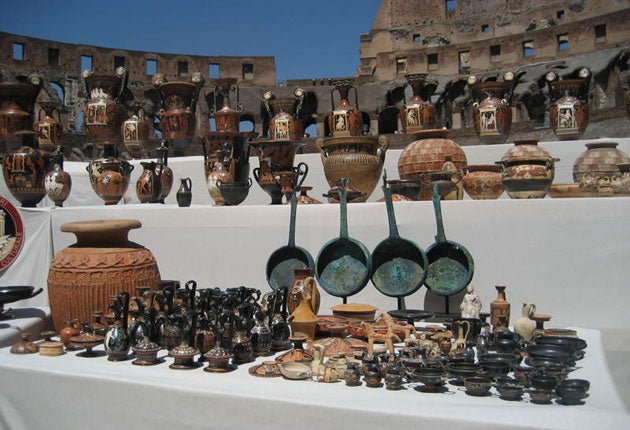Looted antiquities worth millions recovered from black market by Italian police

Your support helps us to tell the story
From reproductive rights to climate change to Big Tech, The Independent is on the ground when the story is developing. Whether it's investigating the financials of Elon Musk's pro-Trump PAC or producing our latest documentary, 'The A Word', which shines a light on the American women fighting for reproductive rights, we know how important it is to parse out the facts from the messaging.
At such a critical moment in US history, we need reporters on the ground. Your donation allows us to keep sending journalists to speak to both sides of the story.
The Independent is trusted by Americans across the entire political spectrum. And unlike many other quality news outlets, we choose not to lock Americans out of our reporting and analysis with paywalls. We believe quality journalism should be available to everyone, paid for by those who can afford it.
Your support makes all the difference.More than 300 looted antiquities, estimated to be worth more than EUR15 million, were displayed to the press this morning in Rome, having been repatriated to Italy after they were discovered in a warehouse in Switzerland.
It was a scene slightly reminiscent of a Victorian detective novel, in which the robber and his looted candlesticks is unveiled before an impressed gathering of country house guests.
Only today's unveiling took place inside the Colosseum rather than on the pages of a 19th century novel and while there was no criminal present, there was plenty of loot, which consisted of objects such as Etruscan ceramic vases, bronze statues from Sardinia and frescoes from Pompeii – 337 objects in total.
A investigation, code-named Andromeda, led by the carabinieri and the Swiss authorities, discovered about 20,000 artefacts in the free port of Geneva, stored in warehouses that were associated with an unnamed Japanese dealer.
The artefacts were illegally taken from archaeological sites in Lazio, Puglia, Sardinia and the area of Magna Grecia – southern Italy and Sicily. They span a period off 1,200 years, dating from the eighth century BC to the fourth AD.
According to Dr Giuseppe Proietti, superintendent for archaeological heritage in Rome, this is one of the most important recoveries of looted antiquities in recent times. He said: "This is one of the most significant recoveries of our national heritage to this day. We hope to return these artefacts to their original localities so that they can be displayed within their historical contexts."
When the Swiss authorities and the Italian carabinieri began to investigate in 2008, the story developed dramatically in a way that could lead to a sequel of The Medici Conspiracy, a factual book that pieces together the circumstances of the Medici antiquities scandal.
Their attention was initially drawn to the British art dealer Robin Symes, who curated the sale of the Venus of Morgantina to the Getty Museum in Malibù. According to the Italian carabinieri, Symes moved to Switzerland, where his activities were monitored. The Swiss and Italian team then discovered several sham companies, some of which were based in tax havens.
Further inquiries led the authorities to a company administrator in Basle who was involved in managing trafficked archaeological objects for his clients – one of whom was Mr Symes, say the Italian carabinieri.
When the carabinieri searched the administrator's luxurious villa in Basle, they found extensive documentation detailing antiquities that were illegally taken from sites around Italy. The documents indicated that Geneva's free port was used as a clearing centre for the illicitly imported artefacts. In December 2008, nine properties and warehouses were sequestered. This is where the 20,000 archaeological artefacts were discovered.
It took the authorities the whole of 2009 to catalogue the antiquities. The 337 objects repatriated back to Italy have been proved to be from illicit Italian excavations. The majority of the objects remain under Swiss jurisdiction.
From Medici to Italy: Repatriation for Boscoreale Fresco and Corinthian Vase
Join our commenting forum
Join thought-provoking conversations, follow other Independent readers and see their replies
Comments